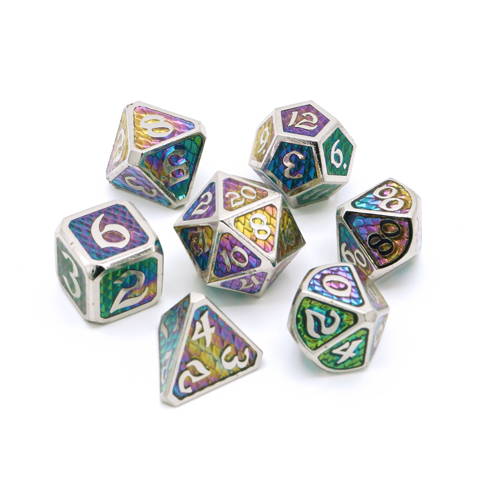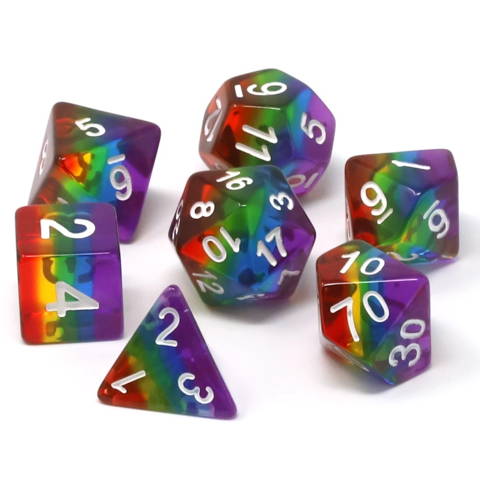Metal vs. Plastic Dice
Seeking the perfect dice set? This scroll of dice knowledge will assist you on your quest!
Weight
Metal dice are typically 4 to 5 times heavier than plastic dice. They feel substantial and rolling them from your hand is very satisfying. Because of their added weight, they roll around less once they hit the table, which makes them feel like they have their own special gravity.
Without their tins, foams, or bags:
Our Forge sets have a total dice weight of: 4.6 oz / 130 ga
Our Mythica sets have a total dice weight of: 4.5 oz / 126 g
Our Dire dice have a weight of: 2 oz / 57 g
A typical polymer set weighs: 1 oz / 28 g
Durability
You guessed right, metal dice win this round. Cast zinc is a lot harder than the polymers used to make plastic dice.
In fact, you should carry metal dice in a separate dice case or bag so they don't scratch your polymer dice by tumbling together. More info on our Caring for Metal Dice page.
Materials and Manufacturing Process
Metal Dice are made of molten lava injected at high pressure into molds. Actually, change "molten lava" to "non-toxic zinc alloy" and that's about right. After casting they are hand polished to remove any fine lines from the mold, then they are coated with a finish using electroplating, and after all that, each face is carefully hand painted. The higher cost of metal dice is tied to all the extra work that goes into making them. Metal dice can be molded in exquisite detail with fine lines and sharp edges.
Plastic dice come in two materials: hand poured epoxy resin or injection molded acrylic.
Resin dice are more time consuming to make, especially if they are poured in layers, such as our Princess Unicorn Bubblegum D&D dice. This is because each layer of resin needs some time to harden up before the next layer can be poured. Resin dice also require a fair amount more hand polishing than acrylic dice. Resin dice are typically tumbled to soften their edges.
Acrylic dice are injection molded, then covered all over in paint and then they go through a tumbling process to removes the paint on the outside surfaces and to polish them. Acrylic are the easiest to mass produce, and therefore the lowest priced.
Finishes
Metal dice are electroplated in a variety of colors and finishes from highly polished chromes to dull matte satin to the look of raw metal:
Sinister Chrome, our favorite dark Chrome
Battleworn finish is similar to satin / matte
Bright shiny chromes in Gold or Silver
Raw Steel, and Gunmetal finishes are less shiny
Scorched Rainbow, made by flame-anodizing a chrome finish
They may not come in chrome, but plastic dice can also be beautiful. They can be translucent! They can also come in multi-color swirls and can even have glitter embedded, all of which make for interesting effects.
Fair Dice
The term "fair" means there is an equally likely chance of landing on each face. As long as all faces are exactly the same size, and the center of gravity is perfect, any shaped face should result in a fair die.
During the manufacturing process, sometimes plastic dice are put in a tumbler to round out their rough edges, and this can cause uneven rounding of the faces.
Metal dice have an advantage: they are much heavier and tend to have more uniform faces. They don't roll as far as plastic, which may seem less random, but rolling or shaking them in your hand is the real source of randomness in both plastic and metal dice.
More to Explore at Castle Die Hard:
- Check out our Best Selling D&D Dice Sets
- Learn about our maxed-out Magnetic Dice Trays
- The 100% Die Hard Dice Guarantee
- Taking care of Metal Dice
- Frequently Asked Questions


